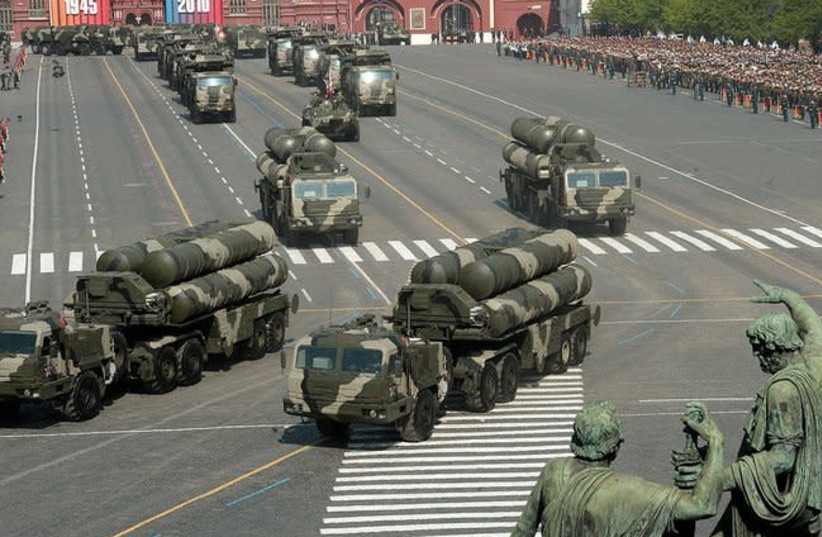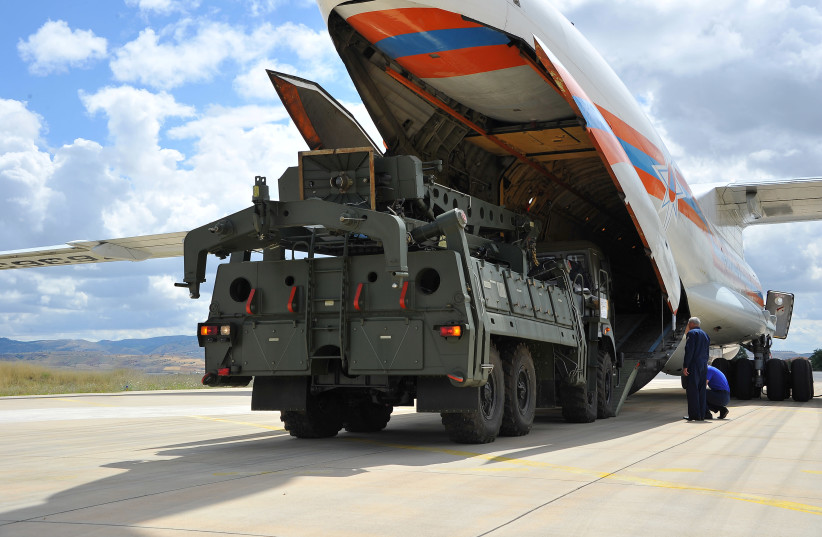Turkey has increasingly become a partner and possible ally for Russia in recent years.
SETH J. FRANTZMANDECEMBER 9, 2021 10:37

Russia plans to deliver another batch of S-400 surface-to-air missile systems to Turkey, the Kremlin spokesman Dmitry Peskov said this week.
Russian media TASS reported that “that this kind of cooperation between Russia and Turkey should not be a threat for any country, especially for Greece, because the system is not offensive, it is defensive.”
Turkey has increasingly become a partner and possible ally for Russia in recent years. Turkey has also clashed with and threatened its NATO allies. “Russia plans to deliver another batch of S-400 missile systems to Turkey, Peskov said in an interview with Greek television channel ANT1,” the report said.
cnxps.cmd.push(function () { cnxps({ playerId: ’36af7c51-0caf-4741-9824-2c941fc6c17b’ }).render(‘4c4d856e0e6f4e3d808bbc1715e132f6’); });
Peskov said when asked about the system, that Russia hopes to provide another batch of the S-400.
Turkey concluded its S-400 deals with Russia during the Trump era when Turkey had a direct line to the White House and its lobbyists had more access to high-level aspects of the US administration. The US administration under Trump empowered Turkey and quietly supported its role in Syria, and its backing of extremists. This led Ankara to feel it had free rein to buy S-400s and increase diplomatic backing for Hamas and to threaten other countries. Now Turkey, Iran, Russia and China are working more closely together on various files, all of which are designed to challenge the US.

First parts of a Russian S-400 missile defense system are unloaded from a Russian plane at Murted Airport, known as Akinci Air Base, near Ankara, Turkey, July 12, 2019. (credit: REUTERS)
“We all know that the United States likes to play this game of sanctions, although we know an understanding they [have] never reached their goals. They have never managed to make a single country change their point of view. But our policy is to be open for cooperation with various countries, especially our partners. This kind of cooperation between Russia and Turkey should not be a threat for any country, especially for Greece, because the system is not offensive, it is defensive. 100% defensive,” Peskov said, according to the report.
This takes place amidst a planning meeting between Russian President Vladimir Putin and Greek Prime Minister Kyriakos Mitsotakis in Sochi. Russia also has tensions with Ukraine and US President Joe Biden spoke to Putin this week. Turkey has sold Ukraine armed drones, which has ruffled feathers in Moscow. Russia prefers to balance relations with numerous countries, including Greece, Israel and Turkey.
The report at Tass notes that “Moscow and Ankara inked an [S-400] deal in 2017 on the delivery of the Russian-made S-400 air defense system to Turkey, thereby making it the first NATO member to purchase this air defense missile system from Russia.” The report goes on to note that “Turkey has not caved to US pressure and said that it would keep the S-400 system. Washington has responded by excluding Ankara from the US program of developing the fifth-generation F-35 fighter-bomber.”
Turkey and Russia want further military cooperation. It remains to be seen how they will balance joint military and defense contacts, gas pipelines like TurkStream, as well as Turkey’s relations with Ukraine. Some pro-Turkey voices in the US who have backed Turkey’s far-right AKP leadership and have likely benefited from Ankara lobbying dollars have tended to portray Turkey as destined to clash with Russia. Under this Cold War concept, Turkey is an ally of the West against Russia. However, the reality is that Ankara has become less democratic in recent decades, imprisoning opposition leaders and media, and it has grown closer to Russia. In addition, Turkey has worked with Iran, even though some argue that Ankara is also destined to clash with Iran eventually. There is no evidence that Ankara or its pro-government media want a closer alliance with the US or view the US favorably. Ankara is increasingly part of the league of authoritarian regimes increasingly opposed to the US and democracies in the West.
Content retrieved from: https://www.jpost.com/middle-east/turkey-to-receive-more-advanced-s-400-anti-air-missiles-from-russia-688264.